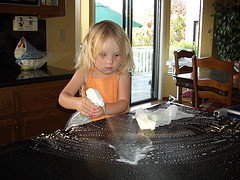Easy DIY Fixes for a Naturally Clean Kitchen
 Are you sick and tired of spending big bucks on chemical cleaners chockfull of scary ingredients? If so, it may seem that your only option is to go out and purchase organic versions with even scarier price tags. However, there are alternatives. You can find some wonderful natural cleaning agents already in your pantry or on the shelf of your local health food store. No advanced chemistry degree is required to use "as is" or mix them up into cleansers that will help you wash away gunk and grime throughout your kitchen.
Are you sick and tired of spending big bucks on chemical cleaners chockfull of scary ingredients? If so, it may seem that your only option is to go out and purchase organic versions with even scarier price tags. However, there are alternatives. You can find some wonderful natural cleaning agents already in your pantry or on the shelf of your local health food store. No advanced chemistry degree is required to use "as is" or mix them up into cleansers that will help you wash away gunk and grime throughout your kitchen.
Dishes
Make your own dishwasher soap with pure, non-toxic ingredients. You can even form it into handy pre-measured tablets. The recipe calls for you to mix all natural borax, washing soda, citric acid, and kosher salt with enough water to hold it all together, then pour it into a mold.
If you don't own a dishwasher or prefer to do your delicate items by hand, make dishwashing liquid from well-diluted castile soap, grated soap, or soap flakes mixed in a 1:4 ratio with warm water. Add a drop or two of essential oil for a pleasant fragrance and store in one of those giant plastic detergent bottles you won't be buying anymore. A set of reusable hand-knitted dishcloths adds even more eco-friendliness.
Counters
The dishwashing liquid described above may also be used for cleaning countertops. Some people like to add baking soda for extra scrubbing action; just make sure you remove all the grit it leaves behind. Be careful never to use vinegar or other acids on stone countertops (granite or marble, for example), because they damage the surface. A magic eraser quickly removes scuffs, especially on counter edges.
Sinks
You can use vinegar to clean and deodorize a porcelain or stainless steel sink, as well as your drain. Wet the sink interior and sprinkle with baking soda. Let sit for 5 minutes, then add a spritz of vinegar or lemon juice, being careful to cover the entire surface. Wait an additional 10 minutes and flush with a kettleful of clean boiling water.
Cabinets
Kitchen cabinets have a tendency to get splattered with oily splotches, especially if they are adjacent to the stove. It may seem counterintuitive, but the best way to get rid of grease is by using more grease. Try rubbing with an oil-based soap or homemade Goo Gone (one part cooking oil to two parts baking soda). Some folks even recommend wiping down with a napkin moistened with a bit of oil. In either case, rinse with warm water. Avoid hard scrubbing with products like Magic Eraser, which may damage cabinets' finish.
Windows
The first green cleaning tip I ever learned was a fast method for getting windows clean and clear. I had thought that the blue stuff in the squirt bottle was the only way to wipe, until I was told that old newspapers work just as well and are much more eco-friendly. Just wet the glass lightly with a spray of water (you can blend a quarter-cup vinegar with 2 cups water for even more cleaning power) and use the crumpled newspaper to gently rub dry. Nowadays, this method is a little trickier since I no longer buy newspapers, but the newsprint flyers that pile up in my mailbox are an acceptable substitute. The paper can be composted after use.
For major, once-a-year window cleaning, I take my windows out of their frames and use rags to wash them down with natural dish liquid. Rinse and wipe dry.
Floors
To avoid scratching, clean dust and dirt from every kind of kitchen floor on a regular basis, using a soft broom or dry dust mop. Hardwood floors in your kitchen and all over your house should be treated with care. Wash them with clear water or cooled tea, making sure not to soak them with water. Other types of flooring may be washed with soap and water. to remove the salt stains so common in areas with icy winters, you can add a splash of vinegar to the soap solution you use on your Chicago tile or resilient floors.
Laura Firszt writes for networx.com.
Looking for a Pro? Call us (866) 441-6648

Cleaning Average Costs
Cleaning Services Experiences

Watch Out For Contractor Red Flags

My Deck Repair Was Simple But Perfect



